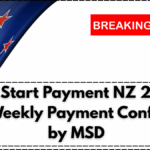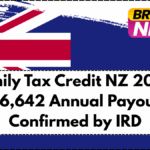In a major win for everyday travelers, the New Zealand government has confirmed the NZ Public Transport Fare Freeze 2026, locking in current public transport prices across the country. As of July 2025, this decision is already shaping future budgeting strategies for many Kiwis relying on buses, trains, and ferries for daily commutes and intercity travel. This move follows increasing public pressure to curb rising living costs and make sustainable transport more accessible.

Table of Contents
How the Transport Fare Freeze 2026 Will Work
The fare freeze will be applied nationwide, covering both urban and regional services. That includes NZ bus train ticket prices in cities like Auckland, Wellington, and Christchurch. Instead of raising fares annually in line with inflation or fuel costs, the 2026 pricing structure will mirror those of 2025. This also includes discounted concession fares for students, seniors, and Community Services Card holders.
Government transport officials stated that funding for the freeze will come from a mix of central government subsidies and regional council support. While the initiative is set to last until the end of 2026, its success could influence longer-term pricing strategies.
Updated NZ Bus Train Ticket Prices Under the Freeze
Below is a table outlining the current (July 2025) ticket prices for major city routes that will remain unchanged through 2026:
City |
One-Way Bus Fare (Adult) |
Train Fare (Adult) |
Concession Fare (Student/Senior) |
|---|---|---|---|
Auckland |
NZD 3.20 |
NZD 4.50 |
NZD 1.50 – 2.50 |
Wellington |
NZD 2.50 |
NZD 3.80 |
NZD 1.20 – 2.00 |
Christchurch |
NZD 2.70 |
N/A |
NZD 1.30 |
These prices apply across standard peak and off-peak travel times, with no scheduled increases throughout the 2026 calendar year.
Why the Fare Freeze is Significant for Urban and Regional Mobility
The NZ Public Transport Fare Freeze 2026 is more than a short-term cost-saving measure. It’s part of a broader strategy to encourage public transport use and reduce carbon emissions. With fuel prices remaining unpredictable, fixed ticket rates can shift more people from cars to buses and trains.
This decision is particularly impactful in regions where income disparity affects access to reliable transport. Keeping NZ bus train ticket prices stable means low-income families won’t be priced out of essential services like healthcare, education, and employment opportunities.
Additionally, the freeze supports consistent travel planning for students and workers whose budgets are tightly managed. With no fare increases on the horizon for the next 18 months, it’s now easier to forecast transportation costs.
What’s Next After the 2026 Transport Fare Freeze?
While the current freeze extends only through December 2026, government transport analysts have hinted at longer-term evaluations based on ridership data and economic performance. There’s growing support for turning the fare freeze into a multi-year strategy, especially if public transport usage increases.
Infrastructure upgrades are also on the horizon, with investments planned in high-frequency bus corridors and improved rail services. These improvements, combined with the fare freeze, aim to improve reliability, reduce congestion, and boost overall satisfaction with public transport networks.
Conclusion
As of July 2025, the NZ Public Transport Fare Freeze 2026 stands as a forward-thinking step toward affordable, equitable, and sustainable travel. By locking in NZ bus train ticket prices, the initiative eases financial pressure while encouraging a shift to greener commuting habits. Whether you’re a student, worker, or senior citizen, knowing your transport costs are stable makes navigating life in New Zealand just a little easier.
FAQ
What is the NZ Public Transport Fare Freeze 2026?
The fare freeze is a government initiative keeping public transport ticket prices at 2025 levels through the end of 2026.
Will discounted tickets still be available during the freeze?
Yes, concession fares for students, seniors, and Community Services Card holders will remain available and unchanged.
Is the fare freeze nationwide?
Yes, it applies to both urban and regional transport services throughout New Zealand.
How is the freeze being funded?
The funding is sourced from a combination of national government support and contributions from regional councils.
Will there be any changes to routes or services?
While prices are frozen, some service improvements and frequency upgrades are expected, especially in major cities.
What happens after 2026?
The government will review the program’s impact and decide whether to extend the freeze or adjust pricing strategies based on new data.
Click here to learn more





